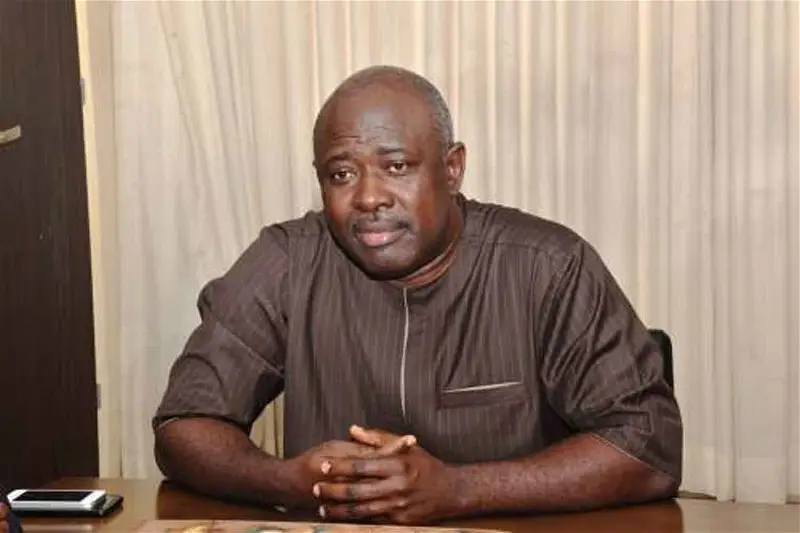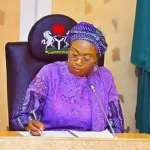The Minister of State, (Oil) Petroleum Resources, Senator Heineken Lokpobiri has assured that Nigeria will witness an increase in oil production on a sustainable basis in the nearest future.
Lokpobiri gave the assurance in Abuja on Monday while addressing stakeholders on his assumption of duty shortly after taking oath of office.
The Minister and his counterpart, Mr Ekperipe Ekpo, Minister of State (Gas), Petroleum Resources were among the Ministers inaugurated by President Bola Tinubu at the State House on Monday in Abuja.
Lokpobiri affirmed his belief in action and announced that he would spend more time in the field and also promised to work together with the stakeholders to boost oil production for the benefit of Nigerians.
“I have got more energy, and I have come to utilise that energy to revamp the petroleum sector.
“I am here with one agenda, which is to increase oil production and in order to increase it, we need to work together to achieve results.
“I am here to provide the leadership so that we can go to the Creeks and resolve all the problems,” he assured.
His counterpart, Ekpo, said who expressed gratitude to the President for founding him and others worthy to serve said he would be committed to a sustainable gas requisite framework and development of gas infrastructure for the benefit of Nigerians.
Ekpo said Nigeria’s proven natural gas reserves occasioned it as one of the nations with the greatest reserve and harnessing the gas reserves would stimulate the domestic economy, gas utilisation and support thousands of jobs for economic growth.
He promised to work tirelessly to translate the potentials into realities for economic advancement.
“With the removal of fuel subsidy the enormous responsibility of providing alternative to fuel lie on the ministry,” he said.
He said in line with the presidential approval of the Compressed Natural Gas (CNG) Initiative, and as an immediate strategy, the ministry would examine the utilisation of CNG for the mass transit sector and associate power-generating infrastructure.
“This will support the economy in many ways including scaling down the cost of transportation which will cause multiplier effects, lower food cost and reverse inflationary trend leading to measurable improvement in living conditions of Nigerians,” he added.
According to him, post-COVID era and the current Russian-Ukraine war has caused imbalances in the global gas industry.
He said in the next few months he would be receiving briefings from relevant MDAs with the view to ascertain the actual status of Nigeria’s gas exploration and utilisation, state of infrastructure delivery, level of access and projects within the gas industry.
He, therefore, urged the National Assembly to grant the ministry needed legislative support to achieve the responsibilities set before the ministry.
“Only together, we can succeed,” Ekpo assured.
Earlier, the Permanent Secretary of the ministry Ambassador Gabriel Aduda, while stating that its target was to ramp up oil and gas production said its efforts extended to the rehabilitation of refineries and the expansion of domestic gas usage.
Aduda said from increasing crude oil production to streamlining petroleum product pricing and distribution, the ministry was revitalising pipelines, encouraging reservoir maintenance projects, and optimising idle heads.
He added that the implementation of automated fuel management systems, the supply of gas to industries, and the enhancement of performance management systems were all steps forward in realising its shared vision.
“With all of these in mind. I extend a warm and hearty welcome to the newly appointed Minister of State (Oil) and the Minister of State (Gas).
“Your dedication, expertise and leadership will be the driving force behind the transformation of our energy sector.
“Together, we embark on a journey to ensure that our nation’s crucial oil and gas resources are managed with the utmost care, responsibility, and strategic vision,” he said.
Aduda said the Ministry which was established in 1975, emerged in recognition of Nigeria’s pivotal status as a prominent oil producer.
“With a mandate encompassing policies for sustainable resource exploitation, regulatory oversight, local content development, environmental protection, and fostering investment, we are entrusted with shaping the trajectory of our nation’s energy sector,” he added.
He explained that the Ministry is guided by constitutional and legal frameworks, adding that the Petroleum Industry Act (PIA) of 2021 introduced transformative changes to governance, regulation, fiscal terms, and community engagement.
He said its adherence to the PIA, the 1969 Petroleum Act for non-converted acreages, the National Gas Policy, and the National Petroleum Policy was paramount in ensuring a robust, responsible, and prosperous energy sector that aligns with evolving global dynamics.
“As we step into these roles. let us acknowledge the key responsibilities and portfolio overview that we have been entrusted with,” he said.
The CEOs and directors of the Ministry’s agencies including the Nigerian Upstream Petroleum Regulatory Commission, Nigerian Midstream and Downstream Petroleum Regulatory Authority, and Nigerian National Petroleum Company were in attendance.
Others are the Petroleum Technology Development Fund, the Nigerian Content Development and Monitoring Board, Nigerian Nuclear Regulatory Authority, and the Petroleum Training Institute.








